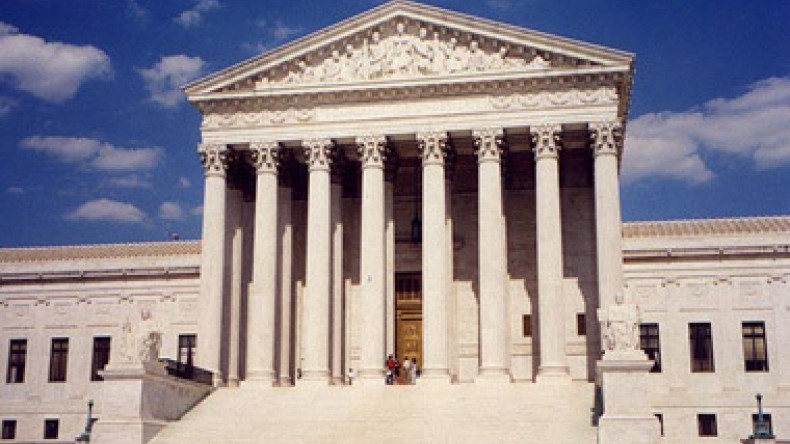
US Supreme Court may hear first ever Armenian Genocide-related lawsuit
For the first time, a lawsuit indirectly involving the Armenian Genocide is being appealed to the U.S. Supreme Court. Since its initial filing in 2003, various federal courts have taken conflicting positions on this lawsuit.
Here is a brief background to the case: In 2000, the California legislature adopted a law -- Section 354.4 of the California Code of Civil Procedure -- extending to 2010 and subsequently to 2016 the deadline for Armenian Genocide victims or their heirs to file claims on insurance policies issued from 1875 to 1923 to persons living in the Ottoman Empire between 1915 and 1923.
In December 2003, several California Armenians filed a class action lawsuit in Federal Court against German insurance companies for refusing to pay the proceeds of life insurance policies purchased by their ancestors in the Ottoman Empire. The German companies, supported by the Turkish government, objected to the lawsuit and sought to have it dismissed. They claimed that the California law authorizing the lawsuit was unconstitutional because its reference to the Armenian Genocide conflicted with the federal government’s policy on this issue.
When the Federal District Court rejected the insurance companies’ argument on June 6, 2007, they appealed to a panel of three federal judges on the Ninth Circuit Court. In a 2-1 opinion, the judges ruled on August 20, 2009 that the California law conflicted with the Executive Branch’s foreign policy prerogative. The Armenian plaintiffs then sought a rehearing of the case by the same panel of three judges. On December 10, 2010, the majority of the judges ruled that the California statute did not violate the foreign affairs doctrine.
Unhappy with this reversal, the German companies appealed to the full (en banc) Ninth Circuit Court. By a unanimous decision, the panel of 12 federal judges ruled on February 23, 2012 that the California law was unconstitutional, as it “intruded on the federal government’s foreign affairs power.” Using the rarely-invoked doctrine of “field preemption,” the judges ruled that Section 354.4 was unconstitutional not due to any conflict with specific actions of the federal government, but because it dealt with an area of exclusive federal responsibility, namely foreign relations.
On June 22, 2012 Igor Timofeyev of Paul Hastings LLP, Counsel for the Armenian plaintiffs, asked the U.S. Supreme Court to review the case. He argued that this is the “perfect vehicle to clarify the foreign affairs preemption doctrine” and that “the Ninth Circuit’s unwarranted expansion of the field preemption doctrine would…imperil numerous state laws dealing with traditional areas of state competency.” Citing congressional and executive branch pronouncements favoring the recognition of the Armenian Genocide, Timofeyev pointed out that the US government not only did not object to the Armenian Genocide resolutions issued by various states over the years, but in fact welcomed them, as Pres. Obama had done in his statement of April 24, 2012.
Meanwhile, a Supreme Court ruling in another case may have improved the prospects for the Armenian appeal. Just days after Timofeyev filed his petition, the Supreme Court issued a ruling on an Arizona statute dealing with undocumented immigrants. The Arizona case raised the very issue that is at the heart of the Ninth Circuit's en banc decision on Armenian insurance policies, namely whether a state law that could indirectly impact foreign relations in a particular area is subject to “field preemption” even in the absence of federal action in that area.
In ruling on the Arizona case, several justices found no preemption in the Arizona statute. Even the majority, which found some preemption in the Arizona statute, severely limited the application of the field preemption doctrine. Specifically, the Court ruled that, while states cannot act in an area where the federal government has a “complete,” “integrated and all-embracing” regulatory system, they can do so where the federal government has “expressed no more than a ‘peripheral concern’” or “done nothing to suggest it is inappropriate” for the states to act.
These statements provide strong support for overturning the Ninth Circuit's en banc decision on the Armenian insurance claims. That point will no doubt be urged on the Supreme Court by the plaintiffs and in the amicus briefs to be filed by the Armenian Bar Association and others.
This lawsuit is basically about non-payment of valid insurance claims and not about genocide recognition. German insurance companies are shamefully exploiting the genocide issue simply to avoid paying long overdue benefits to insurance claimants.
It is not known at this time if the Supreme Court will take up this appeal, since it accepts for review only a small number of cases each year.
By Harut Sassounian
Publisher, The California Courier
Newsfeed
Videos






























